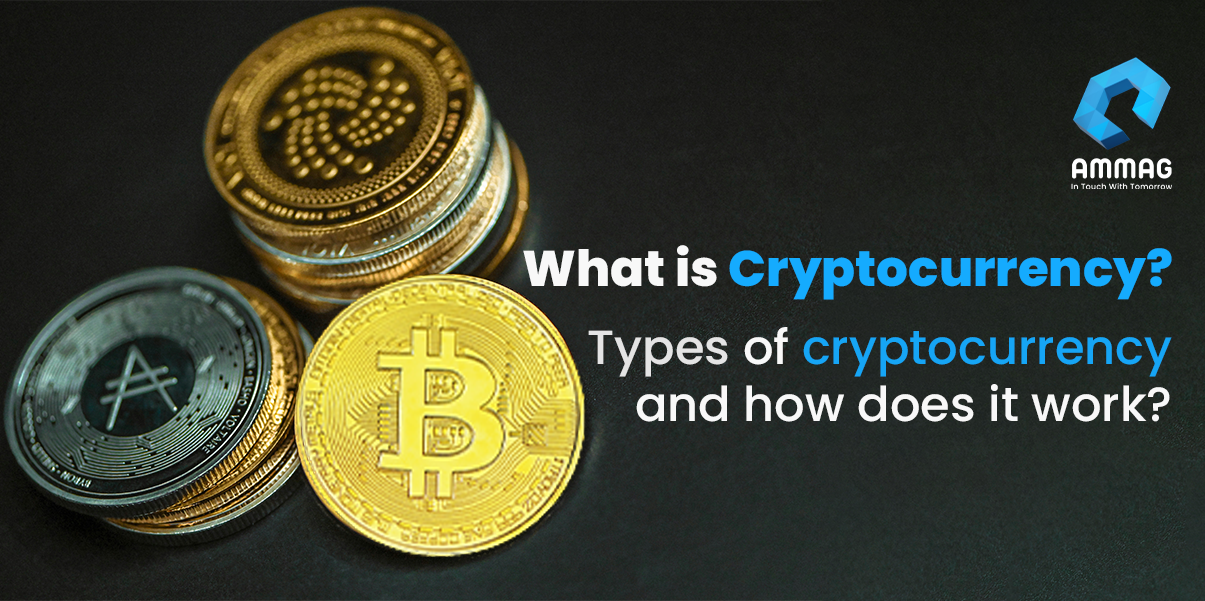What is cryptocurrency, Types of cryptocurrency and how does it work?

Cryptocurrency has rapidly emerged as a revolutionary digital asset in the modern age. It has fundamentally changed the way we perceive and utilize money, offering a decentralized and secure alternative to traditional financial systems. In this blog, we will dive into the intriguing world of cryptocurrency, types and unraveling the workings of crypto trading app development. Let’s begin this journey to understand how this innovative technology is shaping our financial landscape.
Understanding Cryptocurrency
Cryptocurrency, a blend of "crypto" and "currency," is a digital or virtual form of money. What sets it apart from traditional currencies like the US dollar or euro is that it operates on a decentralized technology called blockchain. This blockchain acts as a distributed ledger, recording all transactions across a network of computers.
The core principles of cryptocurrencies are decentralization, security, and transparency. Unlike conventional currencies, cryptocurrencies are not governed by a central authority like a government or bank. Instead, they rely on a network of computers (nodes) to validate and record transactions. This decentralization ensures that no single entity has control over the currency, making it resistant to manipulation.
Security is a paramount feature of cryptocurrencies. Each transaction is secured through advanced cryptographic techniques, making it nearly impossible for unauthorized parties to alter or counterfeit transactions. Additionally, the use of public and private keys ensures that only the owner of a cryptocurrency wallet can authorize transactions.

Moreover, cryptocurrencies promote transparency. All transactions are recorded on a public ledger, accessible to anyone. This openness prevents fraud and creates trust within the network. Cryptocurrencies have the potential to disrupt traditional financial systems by offering an efficient and secure means of transferring and storing value.
The underlying technology behind cryptocurrencies, known as blockchain, is instrumental in ensuring the integrity of the entire system.
How Cryptocurrencies Work?
The functionality of cryptocurrencies revolves around the blockchain, a decentralized digital ledger. Here's how it works:
Transaction Creation:
When a user initiates a cryptocurrency transaction, it is broadcast to
the network of computers (nodes). This transaction contains information such as the sender's and
receiver's wallet addresses, the amount to be transferred, and a digital signature to confirm its
authenticity.
Validation :
Nodes on the network verify the transaction. They check if the sender has the required funds and that the
transaction is valid. This validation process is essential to prevent double-spending, where the same
cryptocurrency is used in multiple transactions.
Adding to the Block
:
Once a transaction is validated, it is grouped with other validated transactions into a block. These
blocks contain a fixed number of transactions and are linked together, forming a blockchain.
Proof of Work (PoW)
:
To maintain the security of the network, cryptocurrencies often employ a
consensus mechanism known as Proof of Work (PoW). In PoW, miners use
computational power to solve complex mathematical puzzles. The first
miner to solve the puzzle gets to add the block of transactions to the blockchain and is rewarded
with newly created cryptocurrency and transaction fees.
Immutable Ledger:
Once a block is added to the blockchain, it becomes part of an immutable and chronological ledger. This
means that the transaction data is permanent and cannot be altered. It provides a transparent history of
all cryptocurrency transactions.
Wallets:
Cryptocurrency owners use digital wallets developed by leading blockchain development firms
to store their funds. A wallet contains a pair of keys: a public key (similar to an account number)
and a private key (akin to a password). The private key is essential for authorizing transactions.

Crypto App Development and Crypto Game Development:
The integration of cryptocurrencies into apps and games is rapidly expanding. Developers are leveraging blockchain technology for creating secure and transparent in-game transactions. This is particularly evident in the growth of crypto app development and crypto p2e game development.
Mining plays a vital role in maintaining the network's security. It involves miners dedicating computational resources to validate and add transactions to the blockchain. In return, they are rewarded with newly created cryptocurrency and transaction fees.
Types of Cryptocurrencies
Cryptocurrencies come in a variety of forms, each with its unique features and use cases. Here are some of the most well-known cryptocurrencies:
Bitcoin (BTC):
Bitcoin is the pioneer of cryptocurrencies, introduced by an anonymous entity named Satoshi Nakamoto in
2009. It's often referred to as digital gold due to its store of value and widespread acceptance.
Ethereum (ETH) :
Ethereum is more than just a digital currency; it's a platform for decentralized
applications (DApps). It introduced smart contracts, self-executing agreements that automate tasks
when predefined conditions are met.
Ripple (XRP)
:
Ripple is designed for swift, low-cost cross-border payments. It's often used by financial institutions to
facilitate international money transfers.
Litecoin (LTC)
:
Created as the "silver" to Bitcoin's "gold," Litecoin offers faster transaction confirmation
times and a different hashing algorithm.
Bitcoin Cash (BCH):
Bitcoin Cash emerged from a Bitcoin hard fork. It increases the block size limit, allowing for more
transactions in each block.
Cardano (ADA):
Cardano is known for its focus on sustainability, scalability, and interoperability. It aims to provide a
secure and scalable infrastructure for the development of DApps and smart contracts.
Polkadot (DOT):
Polkadot is a multi-chain network that enables different blockchains to interoperate, fostering
collaboration and innovation.
Chainlink (LINK) :
Chainlink is a decentralized oracle network, enabling smart contracts to interact with real-world data.
Stellar (XLM):
Stellar's primary focus is facilitating cross-border payments and financial inclusion, particularly in
developing regions.
Binance Coin (BNB)
:
Originally launched as part of the Binance cryptocurrency exchange, BNB is now used for various purposes,
including reducing trading fees.
These are just a few examples of the thousands of cryptocurrencies available. Each has its unique strengths and purposes. It's important to research and understand the characteristics of each cryptocurrency before considering an investment or use.

The Role of Crypto Apps
In recent years, the cryptocurrency landscape has witnessed a surge in the development of cryptocurrency applications, often referred to as "Crypto Apps." These apps have become integral to the cryptocurrency ecosystem and have made it easier for users to buy, store, trade, and use cryptocurrencies.
1. Wallet Apps
:
Cryptocurrency wallet apps allow users to securely store their digital assets. These wallets come in
various forms, including software wallets for mobile and desktop, as well as hardware wallets for added
security.
2. Trading Apps:
Crypto trading apps provide a user-friendly interface for buying and selling cryptocurrencies on various
exchanges. They offer real-time price data, charts, and trading tools to help users make informed
decisions.
3. Payment Apps
:
Some Crypto Apps focus on making cryptocurrencies more accessible for everyday transactions. They allow
users to pay for goods and services using cryptocurrencies at supported merchants.
4. Portfolio Management Apps
:
Blockchain can be used to timestamp research findings and innovations,
providing a verifiable record of intellectual property rights.
This safeguards the work of researchers and encourages innovation in
healthcare.
5. DeFi Apps
:
Decentralized Finance (DeFi) has gained significant traction. DeFi
Crypto Apps enable users to participate in activities such as lending,
borrowing, and earning interest on their cryptocurrencies. For more
understanding explore Defi App development
projects.
6. Educational Apps:
Cryptocurrency apps aren't limited to financial services. Educational apps provide information and
resources for users to learn more about cryptocurrencies and blockchain technology.
Crypto Apps have played a vital role in the mass adoption of cryptocurrencies. They offer convenience, accessibility, and security, making it easier for users to enter the world of digital assets. As the cryptocurrency market continues to evolve, we can expect even more innovative Crypto Apps to emerge.

Crypto Games and Their Integration
Cryptocurrency-based games have gained immense popularity, and their integration into the gaming world has created new avenues for entertainment and earning digital assets. These games often incorporate blockchain technology and cryptocurrencies, offering unique experiences to players. Here below are some of cryptocurrencies game types
1. In-Game Currencies
:
Many crypto games have their in-game currencies, which can be traded or used in various ways. Players can
earn, trade, or purchase these in-game tokens.
2. True Ownership
:
Blockchain technology enables players to have true ownership of in-game assets, such as skins, characters,
or collectibles. These assets are represented as non-fungible tokens (NFTs) on the blockchain.
3. Play-to-Earn
:
The concept of "play-to-earn" has emerged, where players can earn
cryptocurrencies by participating in the game. Some leading p2e game
development firms introduces a new way for players to monetize their
gaming skills and time.
4. Decentralized Applications (DApps)
:
Some crypto games are built as DApps, allowing players to interact directly with smart contracts on the
blockchain. These DApps often provide transparency and security.
5. Virtual Worlds
:
Certain crypto games create virtual worlds where players can explore, socialize, and even build
structures. These virtual worlds can be owned collectively by players through blockchain.

Security in Cryptocurrency
Security is a paramount concern in the world of cryptocurrencies. It's essential to understand the measures in place to protect your digital assets:
Cryptographic Techniques
:
Cryptocurrencies rely on advanced cryptographic techniques to secure transactions and control access to
digital wallets. These techniques make it highly resilient to cyberattacks.
Public and Private Keys
:
Every cryptocurrency wallet comes with a pair of keys—a public key (similar to an account number) and a
private key (akin to a password). The private key is your access to authorize transactions, and it should
be kept secret at all times.
Immutable Ledger
:
The blockchain's immutable nature means once a transaction is recorded, it cannot be altered or deleted.
This feature ensures the integrity of transaction history.
Hardware Wallets
:
For added security, many users opt for hardware wallets. These physical devices store your private keys
offline, making them less vulnerable to online threats.
Multifactor Authentication
:
Utilize multifactor authentication for added security. This means you'll need to provide more than one
form of verification to access your cryptocurrency wallet.
Understanding these security measures is crucial for safely navigating the world of cryptocurrencies and protecting your digital assets.

Future Trends in Cryptocurrency
The cryptocurrency space is dynamic and ever-evolving. Several trends are shaping the future of this digital ecosystem:
Central Bank Digital Currencies (CBDCs)
:
Numerous central banks are exploring the development of digital versions of their national currencies.
CBDCs aim to enhance payment efficiency and financial inclusion.
Decentralized Finance (DeFi)
:
DeFi is set to revolutionize traditional finance by providing a range of financial services without
intermediaries. This trend may increase global access to financial services.
NFTs and Digital Collectibles
:
Non-fungible tokens (NFTs) are gaining prominence in various fields, including art and gaming. They
represent unique digital assets and have the potential to change how we perceive ownership.
Scaling Solutions
:
Scalability solutions like layer-2 networks aim to address congestion issues on blockchains. They will
improve transaction speeds and reduce fees.
Regulatory Frameworks
:
Governments worldwide are working on regulatory frameworks for cryptocurrencies. Clarity in regulation
could encourage institutional investment and mainstream adoption
The cryptocurrency industry's continued evolution promises innovative changes that make it an exciting field to follow.
Role of AMMAG Technologies in Crypto Space:
In the realm of cryptocurrencies, AMMAG Technologies has introduced cutting-edge applications that simplify cryptocurrency transactions and enhance user experiences. These apps provide secure digital wallet solutions, seamless trading interfaces, and convenient payment options. Their commitment to security and user-friendliness has made them a preferred choice among cryptocurrency enthusiasts.
As the best blockchain solution provider, AMMAG Technologies also leads the way in crypto game development. They've pioneered the integration of cryptocurrencies and blockchain technology into gaming, allowing players to engage with in-game assets, trade digital currencies, and explore play-to-earn opportunities.
For further information visit our portfolio: Ammag Technologies Portfolio
Conclusion
Cryptocurrencies have reshaped the financial landscape, introducing a decentralized and secure means of transacting and storing value. As we've delved into the world of cryptocurrencies, it's clear that their influence extends far beyond mere digital tokens.
While cryptocurrencies continue to offer unique investment opportunities and financial inclusivity through trends like CBDCs and DeFi, it's essential to embrace these changes with caution. Understanding the technology, security measures, and potential future developments is crucial for navigating this dynamic landscape effectively.
The future of cryptocurrencies is bright, offering a blend of entertainment, financial innovation, and global accessibility. As the industry evolves, staying informed and adapting to new trends will be key to reaping the benefits of this digital revolution.













-and-How-Does-It-Work/Main-Image_02.jpg)



























